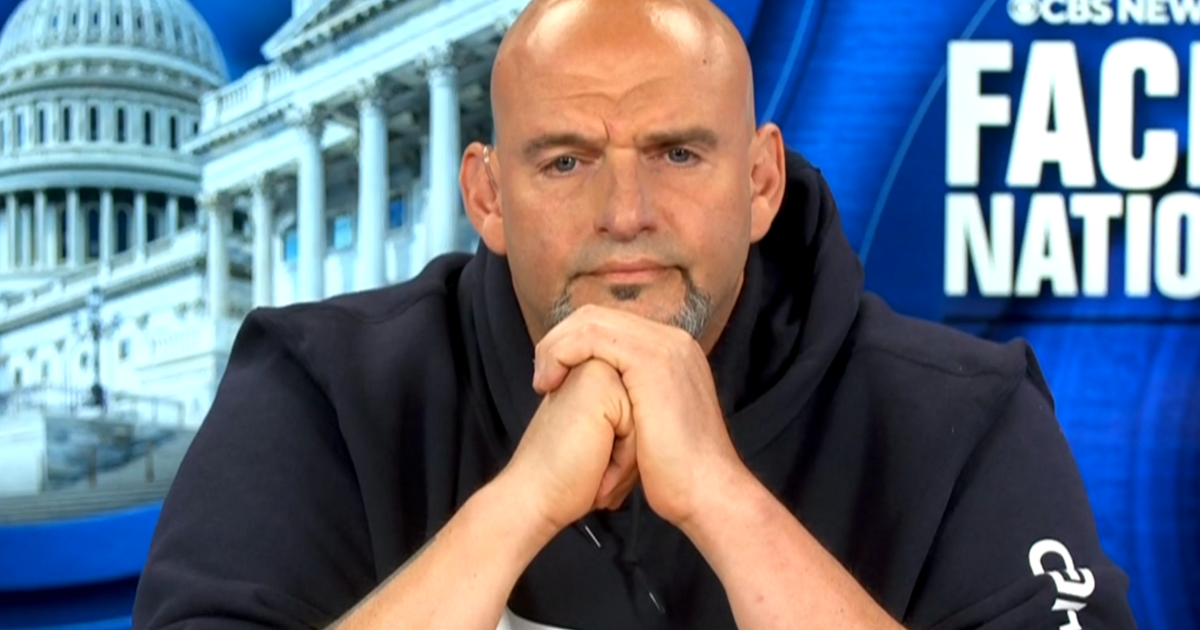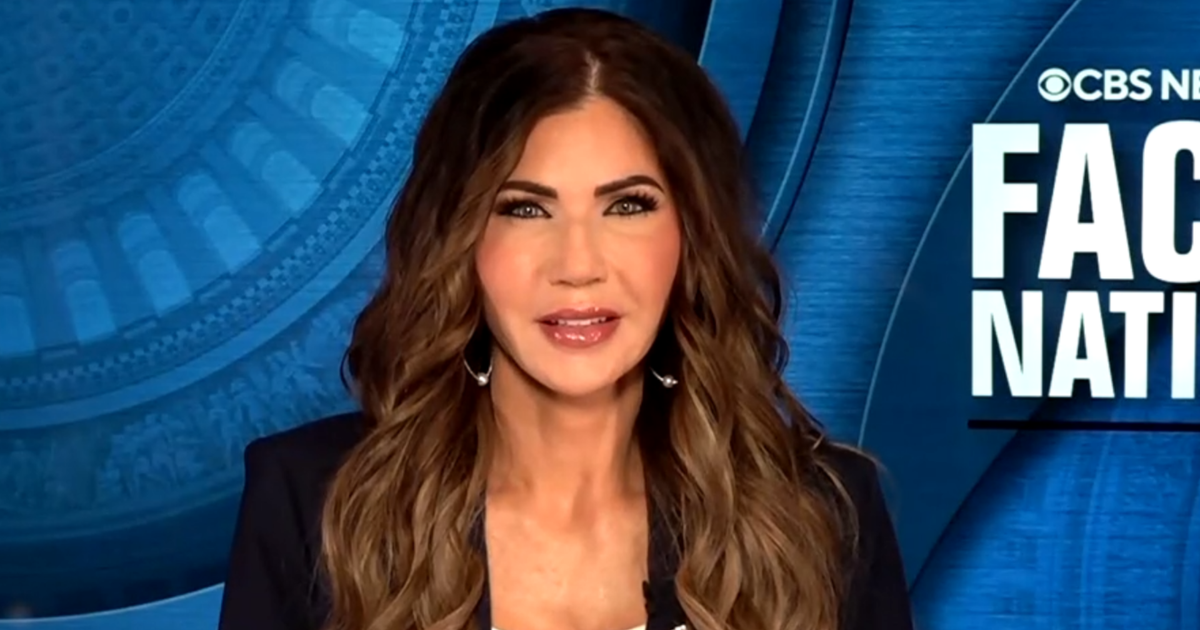Transcript: Joshua Bolten on "Face the Nation," August 25, 2019
The following is a transcript of the interview with Joshua Bolten, president and CEO of the Business Roundtable, that aired Sunday, August 25, 2019, on "Face the Nation."
MARGARET BRENNAN: We're now joined by Joshua Bolten. He is the president and CEO of the Business Roundtable, a lobbying group that represents nearly 200 of the world's largest companies. Many here in Washington also remember him as former White House chief of staff to George W. Bush. Welcome to the show.
JOSHUA BOLTEN: Thanks for having me.
MARGARET BRENNAN: So you just heard the president's economic adviser Larry Kudlow say that the president does have the authority, though he's not using it right now, to essentially stop private investment in China. What do corporations think when they hear that?
BOLTEN: They get worried with that- you know we don't need to go into the details of what authorities the president has, but he- he has a lot of authority through the National Security statutes to disrupt trade and commerce in a way that would cause huge damage, not just to the Chinese economy, but to the global economy and the U.S. economy. So American CEOs are concerned about the escalating tit for tat trade war with China.
MARGARET BRENNAN: And you saw some of that reflected in that selloff that we saw in the financial markets on Friday and some concerned about what's going to be happening in the global economy. We're hearing from American companies that they're worried about investing because they just don't know what's around the corner. And the White House is saying, "trust us on this." Is that enough to invest on? How do corporations plan around that?
BOLTEN: No they can't- they can't plan around that. I mean look it's a- it's a difficult situation because the CEOs of the Business Roundtable have been very supportive of a lot of the objectives that the administration has been pursuing in their negotiation with the Chinese. There need to be structural reforms to get rid of intellectual property theft, to open their markets to more investment, to open their markets to more U.S. products, to stop forced technology transfer, to stop subsidies to- to targeted industries. And all of those things are very important to have happen but if the- if this trade war spirals out of control, the damage is huge. I- I have a lot of respect for Larry Kudlow, but he's just not reflecting the views of American business when he says, "this is all fine." A lot of American businesses now have their foot poised above- right on top of the brake, and they're tapping the brake periodically. What we saw on Friday with the stock market was the markets tapping the brake lightly. But if this spirals out of control, the risk is that everybody's going to slam on the brake and that would be a disaster, not just for the Chinese, but for the United States, as well.
MARGARET BRENNAN: And what is- what- what is that tipping point?
BOLTEN: We don't know where the tipping point is, but- but the- the current situation is- is sounding very risky. Here's- here's what was most concerning about the president's tweet yesterday, which was he's- he's clearly trying to ratchet up the pressure on the Chinese to make the kinds of accommodations we want in the trade negotiations. Business community supports that, but the president's tweet also implied that he thinks it would be either benign or maybe even helpful for the United States to decouple completely from the Chinese economy. That would be a disaster. Not just for the Chinese, for the global economy and for the United States--
MARGARET BRENNAN: This is the world's second largest economy and a huge--
BOLTEN: --the world's second largest economy--
MARGARET BRENNAN: --business partner.
BOLTEN: --and the biggest market for- for the U.S. and everybody else's products and a gateway to the rest of Asia for U.S. exporters. So it is- it is not benign and certainly not helpful to contemplate a complete decoupling from the Chinese. We need to resolve the trade situation. And until we do American businesses' foot is going to be poised over the brake pedal, tapping it periodically, and hopefully not slamming on the brakes.
MARGARET BRENNAN: You- you hear support for the premise, not for the tactics, from a lot of Republicans, but you also hear, though, a- a response in some ways that this is a necessary amount of pain. You also hear out there on the campaign trail a lot of complaints, particularly from Democratic candidates that corporations have been essentially getting the best of American workers for years. President Trump, when he campaigned, essentially said the same thing. This week your organization made a change, saying that your sort of premise for the responsibility of corporations is not first to profits and shareholders, but essentially to their employees. Is this a response to these political pressures?
BOLTEN: No, it's not a response to the political pressures, but it's- it's a recognition of 182 of our CEOs of some of them- America's biggest companies that it's the right thing to do. You know for- MARGARET, for 20 years the- the Business Roundtable has had a policy statement that said the principal purpose of a corporation is to benefit its shareholders. And what the- those 182 CEOs of the Roundtable did this past week is issued a statement withdrawing that previous policy statement and saying, "No, the purpose of a corporation is to serve all of its stakeholders, its customers, its employees, its communities and its shareholders."
MARGARET BRENNAN: And that means higher wages? That means--
BOLTEN: It- it does in some--
MARGARET BRENNAN: --more benefits?
BOLTEN: Ab- absolutely does in some cases. Many of- many of our companies have already raised their- their minimum wages and for the first time the Business Roundtable supports an increase in the minimum wage. But it means taking care of all of your stakeholders because in the very long run you can't take care of your shareholders unless you've taken care of your customers, employees and communities as well.
MARGARET BRENNAN: As- as a Republican, as someone who ran the OMB, do you believe still that deficits matter when you see numbers like you saw this week?
BOLTEN: Yes, deficits absolutely matter. Now they- they have not so far mattered as much as most economists or budget directors would have predicted, but they definitely do matter. But I- I agree with- with Senator Graham when he says that the way to attack this problem is to go after the real drivers of the unsustainable costs in our budget which is our entitlement programs. You cannot balance this budget by shrinking the economy with higher taxes. And you cannot balance the budget by focusing just on the discretionary spending--
MARGARET BRENNAN: Right.
BOLTEN: --which is really a relatively small part of the problem.
MARGARET BRENNAN: Josh Bolten, thanks for joining us.
BOLTEN: Thank you for having me.
MARGARET BRENNAN: We'll be back in a moment.



